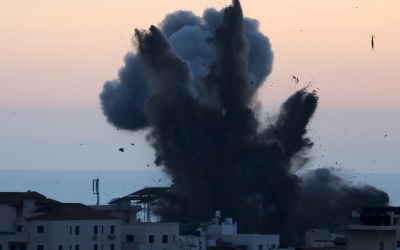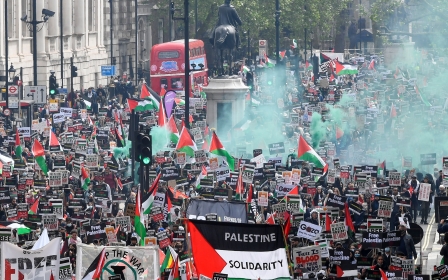'Heartbreaking': Journalist sacked by AP amid Palestine controversy speaks out
The US journalist sacked by the Associated Press over allegedly violating the news agency's social media policy, has decried her termination, saying that she was turned into a "scapegoat" for right-wing outrage.
In a statement released on Saturday, Emily Wilder suggested that her sacking is linked to a right-wing smear campaign that targeted her over past activism for Palestinian rights.
"This is heartbreaking as a young journalist so hungry to learn from the fearless investigative reporting of AP journalists - and do that reporting myself," Wilder said.
"It's terrifying as a young woman who was hung out to dry when I needed support from my institution most. And it's enraging as a Jewish person - who grew up in a Jewish community, attended Orthodox schooling and devoted my college years to studying Palestine and Israel - that I could be defamed as antisemitic and thrown under the bus in the process."
Wilder, who had started officially at the agency on 3 May, did not cover issues related to Israel-Palestine.
The AP insists that it sacked Wilder for social media activity that showed bias during her time of employment at the agency, refusing to point out the specific posts.
"We have this policy so the comments of one person cannot create dangerous conditions for our journalists covering the story," Lauren Easton, global director of media relations and corporate communications at AP, told MEE in a statement on Friday.
"Every AP journalist is responsible for safeguarding our ability to report on this conflict, or any other, with fairness and credibility, and cannot take sides in public forums."
But the reporter's termination coincided with a right-wing campaign against Wilder and the AP itself after the Israeli military bombed a building housing the offices of the agency and other news outlets in Gaza earlier this month.
The Israeli military had claimed that it attacked the media building, which also hosted offices for Middle East Eye, Al Jazeera and other outlets, because it was being used by Hamas - without providing proof to back the allegation.
Right-wing outrage
The AP has said that there was no indication that Hamas operated in the tower.
Still, as press freedom advocates condemned the Israeli attack, American right-wing advocates and lawmakers turned their fury at AP itself, accusing it baselessly of colluding with Hamas.
"Why is the Associated Press sharing a building with Hamas? Surely these intrepid reporters knew who their neighbours were," Republican Senator Tom Cotton said on Monday.
"Did they knowingly allow themselves to be used as human shields by a US-designated terrorist organization? Did the AP pull its punches and decline to report for years on Hamas’ misdeeds?"
Soon after, Republican social media users started targeting Wilder for her college activism in support of Palestinian human rights. Right-wing outlets amplified the attacks.
"I am one victim to the asymmetrical enforcement of rules around objectivity and social media that has censored so many journalists - particularly Palestinian journalists and other journalists of color - before me," Wilder said on Saturday.
Wilder's termination reignited the discussion about the double-standards applied objectivity and past activism by journalists in US media.
While Wilder was sacked, numerous US journalists have ties to pro-Israel group and the Israeli government.
For example, the AP's own former correspondent and editor in Jerusalem, Matti Friedman, had served in the Israeli military and participated in the occupation of south Lebanon prior to joining the news agency from 2006 to 2011.
Last week, Friedman pushed to justify the attack on the building that housed his own former colleagues in Gaza.
"I take army statements like I take foreign press reports – with several grains of salt. But a conversation with a friend who is intimately familiar with military decision-making right now suggests there were indeed Hamas offices there," Friedman wrote in a series of tweets on 16 May.
"The army legal advisers who approve these strikes were convinced that the intel and the military logic could be defended, meaning they saw proof. And because hitting press offices is a net negative for Israel, the army seems to have had a target it considered worth the fallout."
Middle East Eye propose une couverture et une analyse indépendantes et incomparables du Moyen-Orient, de l’Afrique du Nord et d’autres régions du monde. Pour en savoir plus sur la reprise de ce contenu et les frais qui s’appliquent, veuillez remplir ce formulaire [en anglais]. Pour en savoir plus sur MEE, cliquez ici [en anglais].





